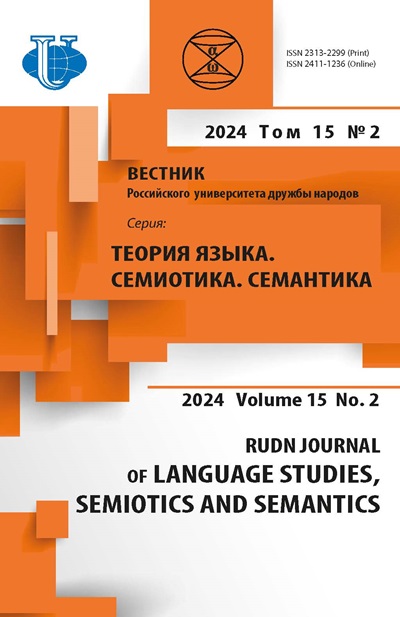LEXICOGRAPHIC PORTRAIT OF A PRONOU OTHER
- Authors: Trufanova I.V1
-
Affiliations:
- Moscow Institute of Open Education
- Issue: Vol 8, No 3 (2017)
- Pages: 509-518
- Section: Articles
- URL: https://journals.rudn.ru/semiotics-semantics/article/view/17012
- DOI: https://doi.org/10.22363/2313-2299-2017-8-3-509-518
Cite item
Full Text
Abstract
The urgency of the work is due to the fact that linguistics does not have a single opinion on the composition of the pronoun as part of speech, grammars do not take into account the fact that for pronouns the transition from discharge to discharge is typical, in the explanatory dictionaries, the number and composition of pronoun values is differently interpreted differently. If the pronoun belongs to two or more lexical-grammatical categories, the question arises, from which to which category it passes. To answer it, it is necessary to study the compatibility of the pronoun with the pronouns of those categories to which it is related, to reveal the common and different between the pronoun of the other and the placeholders, which are close in meaning to it (one or the other). The material is collected from the National Corps of the Russian language. In the history of the Russian language there was a period when one, another, another were close in meaning. And today one, the other, the other, retain in one way or another the old meanings, moreover, if one of them acquires some new meaning, it is likely that others will also develop it. Another is represented by two pronouns-nouns-indefinite and definitive-and two pronouns-adjectives-not definite and definitive. As indefinite, it indicates two different degrees of uncertainty. Other words in the meaning “different from the above” are used with words, any, everything, everything, everything that causes the idea of the illegitimacy of combining the given pronouns and the pronoun of the other in the sense “dif-ferent from the given” in the category of the determinative.
Keywords
About the authors
Irina V Trufanova
Moscow Institute of Open Education
Author for correspondence.
Email: illokucia1@rambler.ru
Trufanova Irina Vladimirovna, Doctor of Philology, Associate Professor, Professor of the Department of Multicultural Education of the Moscow Institute of Open Education; Scientific Interests: theoretical grammar, theory of speech acts, sociolinguistics, narratology
6, Aviatsionnyi side-street, Moscow, Russia, 125167References
- Wiktionary. URL: https://ru.wiktionary.org/wiki/%D0%BA%D0%BE%D1%82%D0%BE% D1%80%D1%8B%D0%B9 (accessed: 29.03.2017). (in Russ).
- Dal, V. (Ed.). (2009). Dictionary of the Living Great Russian language in 4 t. Moscow: Olma-press. URL: http://enc-dic.com/dal/Inoj-11512.html (accessed: 29.03.2017). (in Russ).
- Efimova, T.F. (Ed.). (2009). Explanatory dictionary of the Russian language. Moscow: Gorodets. URL: http://tolkslovar.ru/i10058.html (accessed: 29.03.2017). (in Russ).
- Kuznetsov, S.A. (Ed.). (1998). Large explanatory dictionary of the Russian language. Sankt Peterburg: Norint. URL: http://enc-dic.com/kuzhecov/Ino-61894.html (accessed: 29.03.2017). (in Russ).
- Ozhegov, S.I. & Shvedova, N J. (1999). Еxplanatory dictionary of the Russian language. Moscow: Azbukovnik. URL: http://enc-dic.com/ozhegov/Ino-13310.html (accessed: 29.03.2017). (in Russ).
- Otkupshchikova, M.I. (1984). Pronouns of the modern Russian language in the structural-seman¬tic aspect. Leningrad: Publishing house of the Leningrad University. (in Russ).
- Paducheva, E.V. (1973). About the transformations pronominalizacii: deep structure proposals with words of one another. Grammatical Problems. Moscow: Nauka. (in Russ).
- Dictionary of the Russian language in 4 t., red. A.P. Evgen’eva. (1985—1988). Moscow: Nauka. URL: http://enc-dic.com/academic/Ino-15694.html (accessed: 29.03.2017). (in Russ).
- Dictionary of Russian language in 4 t., red. D.N. Ushakov (1935—1940). Moscow: OGIZ. URL: http://tolkslovar.ru/i10058.html (accessed: 29.03.2017). (in Russ).
- Fasmer, M. (1964—1973) Etymological dictionary of the Russian language in 4 t. Moscow: Progress. URL: http://enc-dic.com/fasmer/Ino-4958.html (accessed: 29.03.2017). (in Russ).
- Fedorova, M.V. (1965). Lexico-grammatical sketches on history of Russian pronouns. Voronezh: Publishing house of Voronezh State University. (in Russ).
- Čuglov, V.I. (1990). The words “other” and “else” in modern Russian language. Russian lan¬guage at school, 1, 70—75. (in Russ).
- Shansky, N.M. & Bobrova, T.A. (2004). School etymological dictionary of the Russian language. Origin of words. Moscow: Drofа. URL: http://enc-dic.com/rusethy/Ino-668.html (accessed: 29.03.2017). (in Russ).
- Shuvalova, I.E. (2007). Semantics of Russian Pronouns. Kursk: Publishing house of the Kursk state University. (in Russ).













